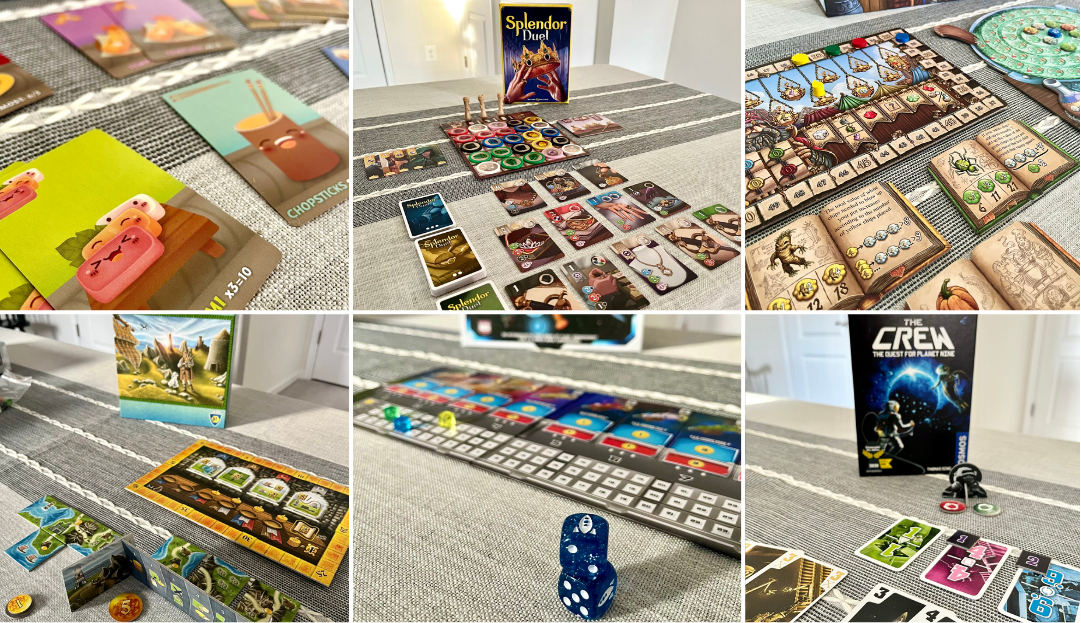Welcome to this week’s gaming post! I’ve received a few requests for suggestions on games I’d recommend for people just getting into board gaming – also known as gateway games in the hobby. Maybe you’re already familiar with the classics, such as Catan, Carcassonne, or Ticket to Ride, so here are a few newer games and some of my go-tos when I’m looking for either a filler, light game, or one to teach to new gamers. So without further ado, let’s jump into the games.
Honorable Mention: Sushi Go!
- Designer: Phil Walker-Harding
- Complexity: Light
- Time: 15 Minutes
- Players: 2-5
- Main Mechanisms: Card-Drafting

Sushi Go! is one of the first games I taught to my partner, and it is still one of her all-time favorite games. In Sushi Go!, players are simultaneously drafting cards from a hand of cards, trying to build sets of sushi to score points. After selecting a card from their hand, the player passes their hand to the player on their left and the round continues until all cards in the round have been drafted. The core card-drafting mechanism is very similar to games like 7 Wonders, but with fewer symbols to keep track of, making it an excellent choice as a gateway game. Sushi Go! is the lightest game on this list, with games taking less than 30 minutes, and the game serves as a great introduction to the card-drafting mechanism, popular in many other games. Plus, the game comes in a small tin that’s easy to travel with (we’ve brought it on a picnic!), and the overall cute aesthetic is sure to interest even non-gamers.
5. Splendor/Splendor Duel
- Designers: Marc André, Bruno Cathala
- Complexity: Light
- Time: 30 Minutes
- Players: 2-4
- Main Mechanisms: Engine-Building, Resource Management
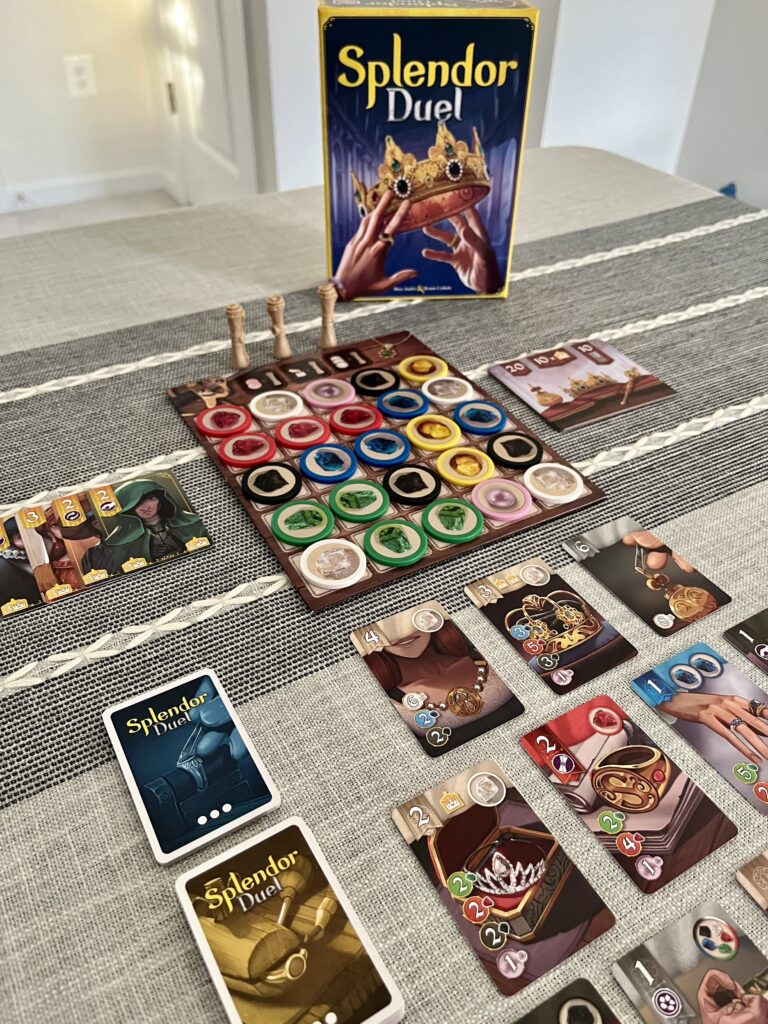
Splendor is a game where players collect colored chips and use them to purchase/build cards in their personal tableau. The interesting mechanism is that each card a player builds grants the player a discount to one of the gem types for future builds. This creates an interesting engine where players are able to build higher value cards as the game progresses until one player reaches a certain number of points needed to win. Splendor Duel is the recent two-player only follow-up to Splendor, and my personal favorite between the two since it adds an interesting twist to how gems are collected. If you’re looking for a game to play with a friend or partner, I’d recommend Splendor Duel first, but if you regularly play with more than two players, then you won’t go wrong with Splendor either.
4. The Quacks of Quedlinburg
- Designer: Wolfgang Warsch
- Complexity: Light
- Time: 45 Minutes
- Players: 2-4
- Main Mechanisms: Bag-Building, Push-Your-Luck
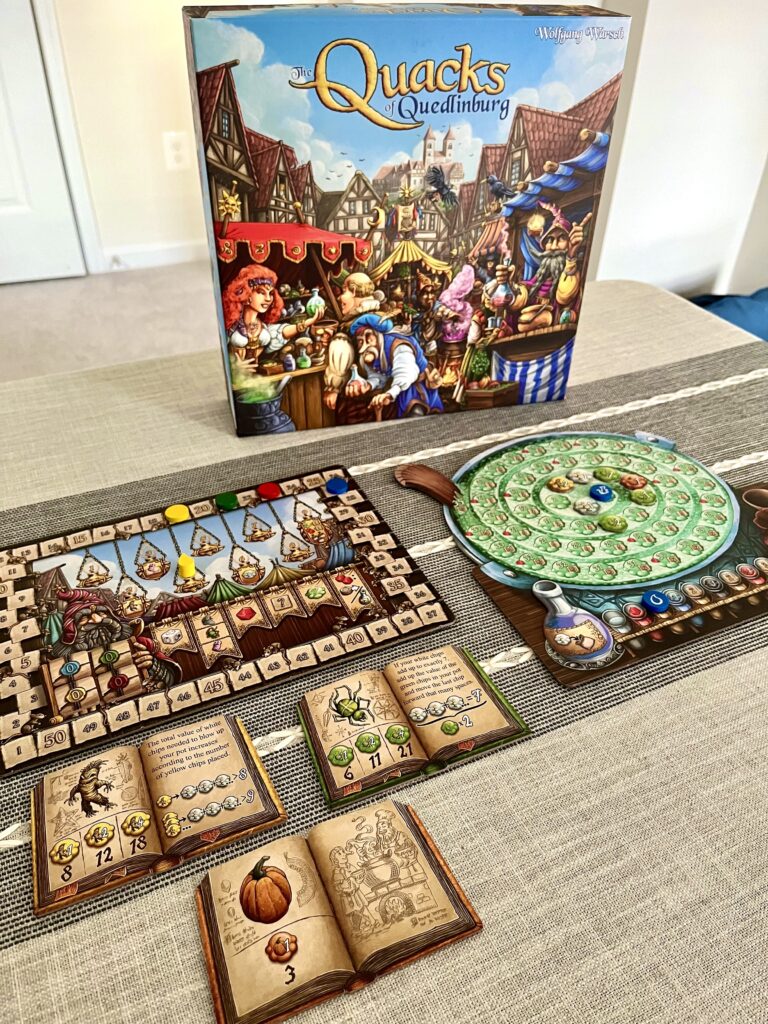
The Quacks of Quedlinburg is a push-your-luck style game where players simultaneously draw tokens from their bag, which increases the value of their potion and is used to determine the number of points the player will score that round, as well as how many coins they will have to spend on new ingredients to add to their bag for the next round. During a round, players continue to pull tokens from their bag until either they choose to stop or their pot explodes. One of the great things about this game is that there are four sets of token variations in the core game, which increases the replayability, and you can use this to adjust the complexity from game to game (this is also great for teaching to new players). The main thing to know going in is that there is a lot of luck in this game, so it’s important to not take the game too seriously. However, whether or not my pot explodes, I still always enjoy my plays of Quacks and the many laughs that it brings.
3. Isle of Skye: From Chieftain to King
- Designers: Andreas Pelikan, Alexander Pfister
- Complexity: Light
- Time: 30-50 Minutes
- Players: 2-5
- Main Mechanisms: Tile-Laying
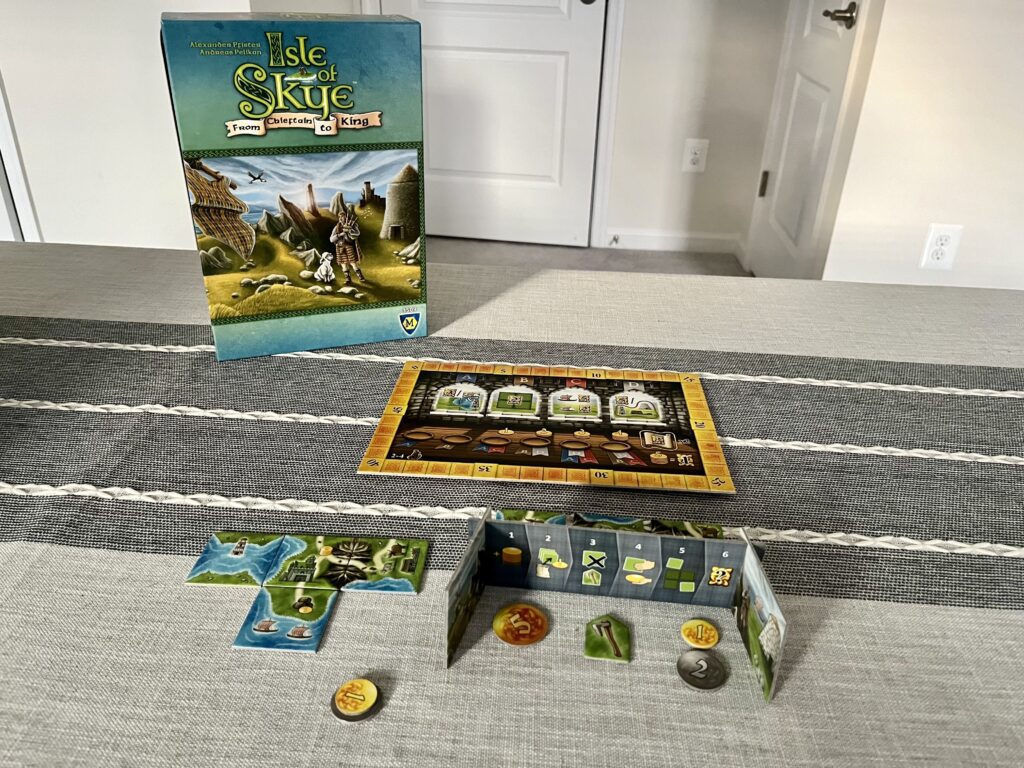
I recently referenced Isle of Skye in one of my latest posts regarding Carcassonne. In it, I said that I would almost always lean towards Isle of Skye over Carcassonne when looking for a tile-laying game. Although slightly more complex than Carcassonne and the other games I’ve mentioned on this list, I still think Isle of Skye is a great introduction to tile-laying games. The highlight for me with this game is how players simultaneously and secretly price their tiles at the start of each round before players take turns purchasing the tiles from other players. If you price your tiles too low, someone else might buy them, and then you won’t be able to play them. However, if you price them too high, you might end of paying that amount to the bank in order to keep them. This creates an interesting dynamic where players have to determine not only how much they value their tiles, but how much other players also value those same tiles. At the end of each round, once players have placed any tiles they purchased that round, each player scores points for their territory of tiles based on the scoring tiles for that round. Not all tiles will score in each round and only a subset of scoring tiles are included in each game. This is also great when teaching to new players because instead of randomly selecting four scoring tiles, you can just include the easiest ones to teach. Even with the slightly steeper learning curve compared to the other games on this list, I still think this is a great gateway game, and is one of my all-time favorites.
2. Space Base
- Designer: John D. Clair
- Complexity: Light
- Time: 60 Minutes
- Players: 2-5
- Main Mechanisms: I roll, everyone gets stuff
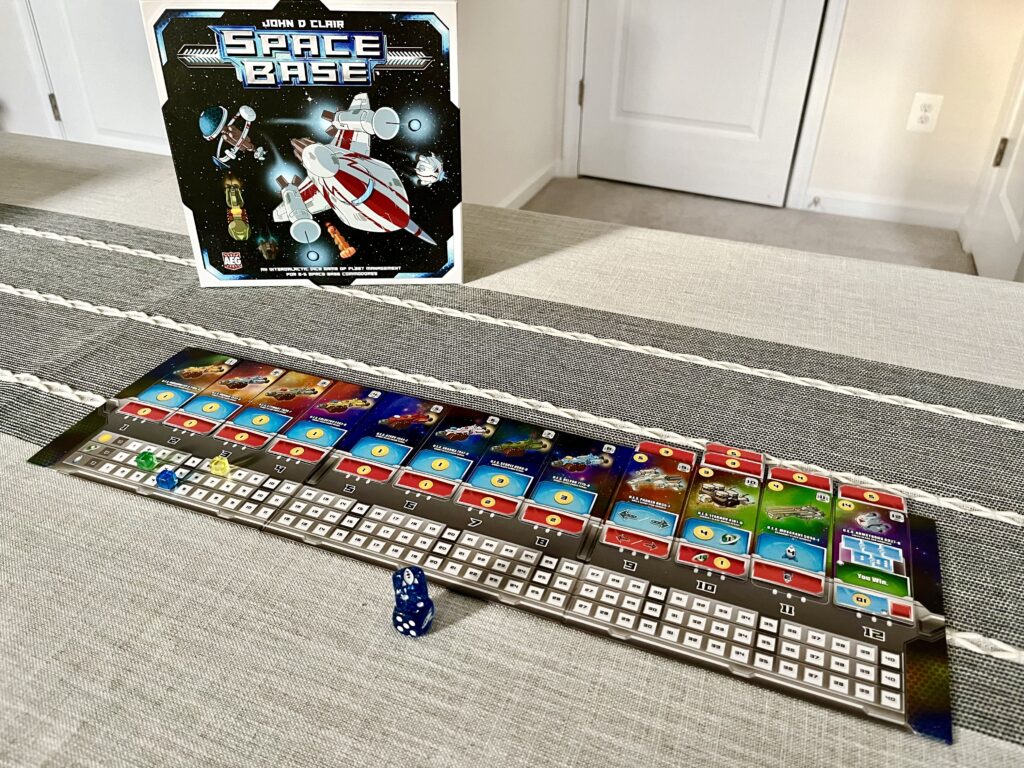
Space Base is an engine/tableau-building game where each player starts with a ship card corresponding to each dice-roll from one-to-twelve. I recently taught this to a couple of non-gamers and they were able to pick it up after the first couple of rounds. Each round consists of players taking turns rolling two dice, and then every player gets to use those two dice rolled to activate all their ships card of that number to receive either money (used to purchase new ships granting better rewards when rolled), income, or points depending on the ship card. There’s so much replayability in Space Base – do you decide to focus on the low luck cards for a steady supply of money or points, or do you choose to double down on the long odds cards for a big payday? There’s even a “You Win” card that I’ve never successfully pulled off, but I always go for whenever I see it come out. Every game plays out differently based on the ship cards that come out and the dice rolls that you choose to focus on, and the “I roll, everyone gets stuff” mechanism ensures that everyone is engaged throughout, even on other players turns.
1. The Crew: The Quest for Planet Nine/Mission Deep Sea
- Designer: Thomas Sing
- Complexity: Light
- Time: 20 Minutes
- Players: 2-5
- Main Mechanisms: Trick-Taking
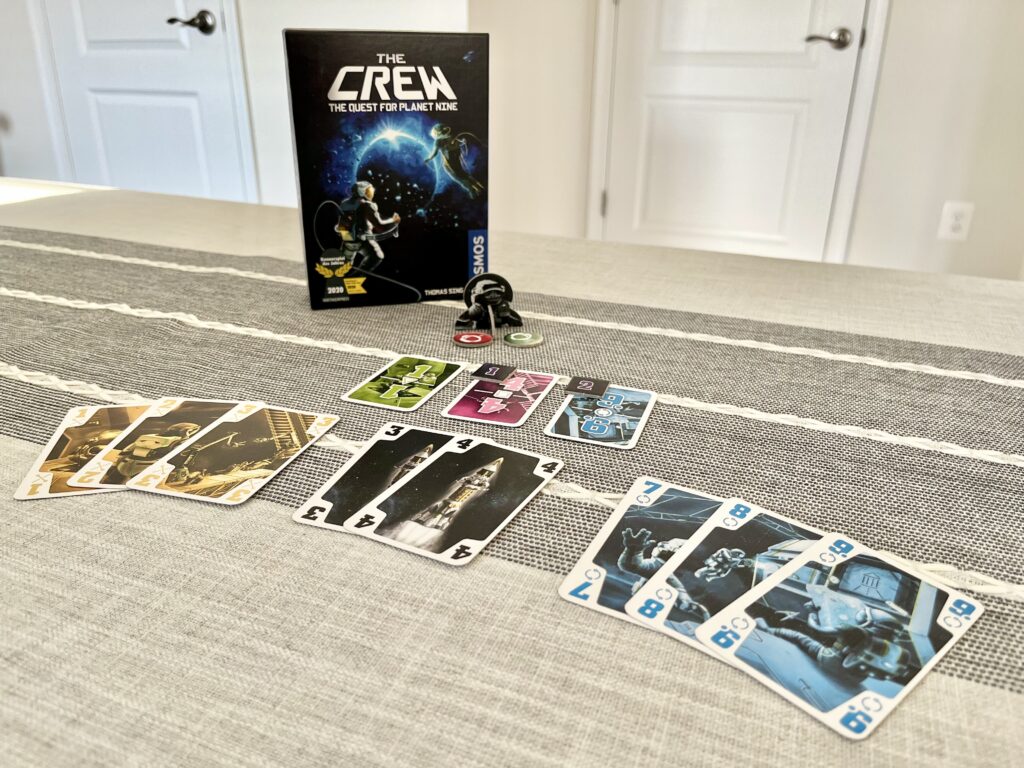
The Crew is a cooperative, trick-taking game where players are challenged to win certain types of tricks. I recently covered The Crew in a recent highlights post, and I’d recommend checking that out if you want to hear my detailed thoughts on the game. What makes this my number one recommendation for Gateway Games is the cooperative nature of the game, how fast games play out (easily less than 10-15 minutes), and how easy it is for players who are familiar with other trick-taking card games (Hearts, Spades, etc.) to learn this one. While the game really shines at four players, I’ve heard of friends who like to play it solely with their partner. As I mentioned in my other post, I’ve used The Crew as a quick filler, at the end of a long board gaming session, or even as the main game where we play for a couple of hours. My recommendation would be to pick up the newer Mission Deep Sea edition for the additional objective variety, but I’ll happily play either game. Both games come with a story book with a large number of missions to complete, but players can also easily just draw a certain number of objective cards, making it very easy to tailor the difficulty level. This is easily my go-to game to introduce friends new to board gaming, and I’ve even had friends buy their own copy of The Crew after I showed the game to them. Whether you’re new to trick-taking or a seasoned veteran, I can’t recommend The Crew highly enough as the perfect jumping in point to board gaming.
With that, I’ll wrap up this week’s post! I’d love to hear your thoughts on any of the games I’ve mentioned, future content, or format in the comments section below. Happy gaming!
